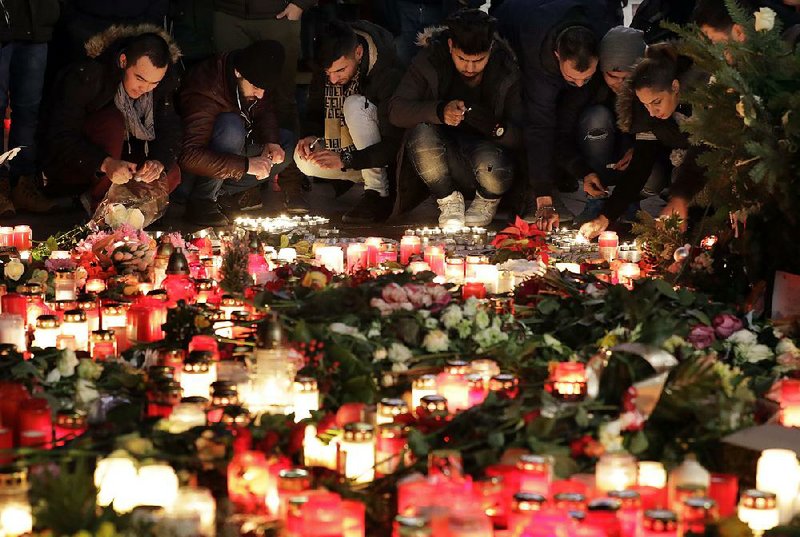BERLIN -- The prime suspect in the deadly attack on a Berlin Christmas market -- a 24-year-old Tunisian migrant -- was the subject of a terror investigation in Germany earlier this year, a senior official said Wednesday.
The suspect -- who went by numerous aliases but was identified by German authorities as Anis Amri -- was not deported after his rejection for asylum because Tunisia initially refused to take him back.
Amri became the subject of a national manhunt after investigators discovered a wallet with his identity documents in the truck used in Monday's attack that left 12 dead and 48 injured, two law enforcement officials said.
Meanwhile, a clearer portrait took shape of the suspect, including accusations that he had contact with a prominent Islamic State recruiter in Germany and once tried to obtain a gun.
German authorities issued a $105,000 reward for information leading to his capture, warning people not to approach Amri, whom they described as "violent and armed."
His past record, however, further deepened the political fallout from Monday's bloodshed -- pointing to flaws in the German deportation system and putting a harsh light on Chancellor Angela Merkel's humanitarian bid to open the nation's doors to nearly 1 million asylum seekers last year.
Although the vast majority of those who flooded into Europe were on the move to escape war and unrest, dozens of terror suspects have slipped into Germany and neighboring nations posing as migrants. Amri, officials said, was not part of the surge of migrants who entered Europe by the one-time main route from Turkey and Greece.
Rather, he arrived in Germany last year through Italy, where he apparently had entered as early as 2012. He applied for German asylum, but was rejected in June and later faced deportation.
Amri was the subject of a terror investigation on accusations of "preparing a serious act of violent subversion," and had known links to Islamist extremists, authorities said.
Why a failed asylum seeker with such links and no passport was walking German streets is "the question 82 million Germans probably want an answer to," said Rainer Wendt, chairman of the German Police Union. "People are rightly outraged and anxious that such a person can walk around here, keep changing his identity and the legal system can't cope with them."
He added: "How many more ticking time bombs are roaming around here? ... We saw how much damage one person can do with a truck."
No passport
The dragnet for the suspect appeared initially to focus on the German state of North Rhine Westphalia as well as Berlin, both places where the Tunisian suspect once lived. Police units were expected to stage raids, but remained on hold.
The interior minister in North Rhine Westphalia, Ralf Jager, said the Tunisian man had bounced around Germany since arriving in July 2015, living in the southern city of Freiburg, and later in Berlin.
Though authorities have sought to accelerate the deportation of rejected asylum seekers this year, there is still a backlog in Germany of tens of thousands, many of whom are able to resist because their countries of origin refuse to take them back. Amri, Jager said, was one of them.
Amri had not been deported because -- like many asylum seekers in Germany -- he did not have a passport. The Tunisian government, Jager explained, initially denied he was their citizen, and delayed issuing his passport. Pending his deportation, Amri had received a "toleration" status from the government.
Amri's new Tunisian passport, Jager said, finally arrived Wednesday.
"I don't want to comment further on that circumstance," Jager said.
According a German security official with knowledge of the case, Amri earlier this year tried to buy a gun from an informant for the German authorities in the state of North Rhine Westphalia.
Authorities knew that Amri had "interacted" with Abu Walaa, a 32-year old of Iraqi descent arrested in November on charges of recruiting and sending fighters from Germany to the Islamic State group. Key evidence in Walaa's case came from an Islamic State defector who had returned to Germany and accused Walaa of helping to recruit him and arrange his travel to Syria.
"Anis Amri was engaging with extremist Salafist circles in Germany," the official said.
Karen Muller, spokesman for the Berlin prosecutor, said Amri also had been under police surveillance for several months until September this year, because he was suspected of planning a burglary in Berlin to finance the purchase of weapons. The suspicion wasn't confirmed. He was, she said, only found to be a small-time drug dealer.
The surveillance measures were called off in September, by which time Amri had disappeared from his regular haunts in Berlin, prosecutors said.
Role unclear
It remained unclear whether authorities believe the Tunisian drove the truck, but police nevertheless made tracking him a priority.
Germany Interior Minister Thomas de Maiziere cautioned that he was "a suspect, not necessarily the perpetrator."
"We are still investigating in all directions," he said. "Success counts, and not speed or speculation."
A spokesman for Tunisia's anti-terrorism judicial police said investigators questioned Amri's family members at their home Wednesday in the central Tunisian town of Oueslatia.
Spokesman Sofiane Selliti did not say how many people were questioned. His family lives in poverty and his parents are divorced, according to Tunisia's Mosaique FM radio, which reported that the father said he had no contact with his son, although his other sons did.
The two German law enforcement officials, who spoke on the condition of anonymity to discuss a sensitive case, said investigators discovered the Tunisian's documents in the cabin of the truck that barreled into the market.
Witnesses described one man fleeing the scene after the truck -- packed with a cargo of steel -- roared into revelers at a traditional Christmas market. One suspect, a Pakistani asylum seeker, was arrested on Monday night, but authorities later released him over a lack of evidence.
The new information emerged as German investigators raced for clues in the hunt for Amri and any other possible suspects. They pored over forensic evidence and GPS data as they sought to retrace the steps of the runway attacker. They were re-questioning witnesses and analyzing DNA traces found in the truck, and well as on the body of a dead Polish man in the passenger seat.
The Pole worked for a trucking company and was delivering a payload of steel to Berlin. Investigators are currently going on the assumption that he was taken hostage by the assailant -- and may even have died a hero. Jorg Radek, deputy chairman of the German Police Union, said evidence suggested that "a fight took place in the driver's cabin." As it careened toward the crowded market, the truck was not driving straight, but "in a zigzag line," he noted.
The Islamic State group on Tuesday claimed responsibility for inspiring the attack. The claim led some politicians to quickly point the finger at Merkel's refugee policy, even as others pushed back, calling the accusations a politicizing of tragedy that had no place in progressive Germany.
Refugee blowback
Revelation of the asylum seeker's background stoked anger among conservative politicians, and seemed set to damage Merkel, who is running for re-election next year.
"There is a connection between the refugee crisis and the heightened terror threat in Germany," Stephan Mayer, parliamentary spokesman for the Christian Social Union party on domestic affairs, told reporters. "This can also be seen in the case of this Tunisian."
Some German lawmakers have called for consequences.
"In my view we experienced a major shift on Monday," said Mayer, a member of Merkel's center-right bloc. "Terrorism has reached a new level in Germany. It's shaken the nation and citizens are worried. I think citizens wouldn't accept it if we simply returned to the political order of the day."
Mayer proposed extending the period that people can be held in detention before deportation in order to give authorities more time to gather the necessary paperwork. He said authorities also should be able to deport people deemed a threat to public order.
Germany's Federal Criminal Police Office currently considers 549 Islamic extremists capable of committing "politically motivated crimes of considerable significance."
Wendt, the police union official, said keeping tabs on all of these people was a major challenge.
"From a manpower perspective it would ... be unimaginable to keep all potential threats under police surveillance round the clock," he said.
There also were growing calls for the deployment of more police on the streets with military-style weapons. At the normally quaint and picturesque Christmas markets in at least three German cities -- Mainz, Magdeburg and Dresden -- concrete barriers were quickly erected for added security. In Magdeburg, police officers armed with automatic weapons were guarding the entrance.
Yet others argued that living a free society was perhaps more important, and that Germans were willing to accept a certain measure of risk to preserve that openness.
"If we want to maintain the freedom of our society, we simply have to live with the risk contained in this decision," Die Tageszeitung newspaper said in a Wednesday editorial.
Information for this article was contributed by Anthony Faiola, Stephanie Kirchner and Souad Mekhennet of The Washington Post; by Frank Jordans, Geir Moulson, Bouazza ben Bouazza and Lori Hinnant of The Associated Press; and by Melissa Eddy of The New York Times.
A Section on 12/22/2016



